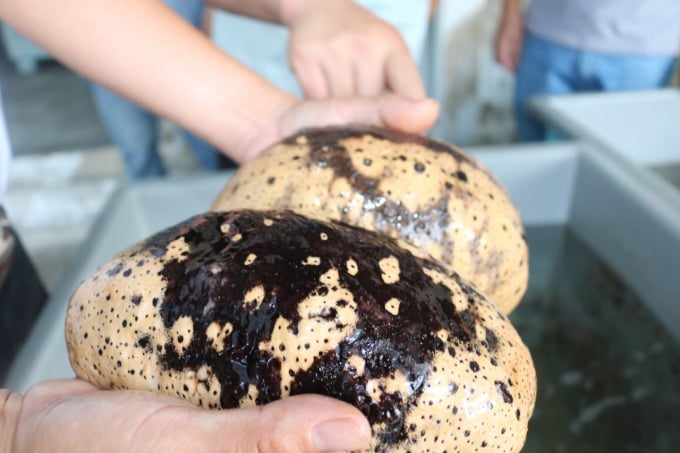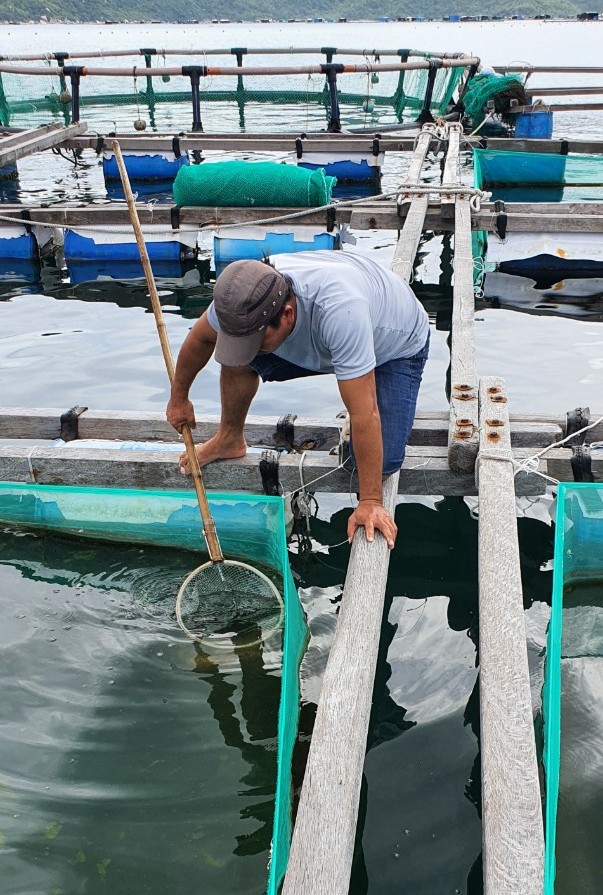May 21, 2025 | 03:32 GMT +7
May 21, 2025 | 03:32 GMT +7
Hotline: 0913.378.918
May 21, 2025 | 03:32 GMT +7
Hotline: 0913.378.918

Holothuria fuscogilva is of high economic value. Photo: Kim So.
The Research Institute for Aquaculture III (RIA3), under the Ministry of Agriculture and Rural Development (MARD) and Australia’s University of the Sunshine Coast (USC) have organised a workshop to evaluate the results of the project on the enhancement of high-value sea cucumber production through novel molecular technologies.
According to Professor Abigail Elizur from USC, Vietnam needs around 20 million juveniles of sea cucumbers for aquaculture but there are only about one million juveniles sandfish (Holuthuria scabra). Therefore, the replication of white teatfish (Holothuria fuscogilva) is very necessary to meet the demand of the market, while increasing the economic value of sea cucumbers.
Holothuria fuscogilva is one of the mosta high-value sea cucumber species, and RIA3 has been an ideal place producing sandfish, so it is very suitable to study the white teatfish since the institute has a lot of experience in this field, Elizur said.
The use of a hormone made at the USC, which is extracted from the nerves of the sea cucumber itself, and then transplanted into the fungus that multiplies on a large scale in the laboratory, the hormone is effective and does not affect the health of the sea cucumber bloodstocks, she added.
Nguyen Dinh Quang Duy from RIA3 agreed, saying the adoption of hormone therapy instead of traditional methods has successfully stimulated the reproduction of Holothuria fuscogilva.
Nearly 20,000 juveniles of the white teatfish have been produced for experiments and for pilot commercial culture.
Promising results have been achieved in the pilot culture of the white teatfishin cages in Khanh Hoa and Quang Ninh provinces.
During 8-month culture, the juvenilesreachedup to 60grams from 0.3 grams with the survival rate was about 92 percent.
Nguyen Duc Thoai in Van Ninh District’s Van Thanh Commune, a farmer who takes part in the experiment said:” “The white teatfish grows very well and has a high survival rate.”
He hoped that the project would be expanded to help farmers in need.
Addressing the workshop, Andrew Barnes, Deputy Head of Mission, Australian Embassy in Vietnam appreciated the cooperation between USC and RIA3 which successfully produced Holothuria fuscogilva by a new method.
It opened up opportunities to produce valuable sea cucumber for this industry, he said.
Barnes said the project would help reduce the pressure of sea cucumber exploitation in the wild, thereby better protecting the environment.
Vo Khac En, deputy head of Khanh Hoa Fisheries subdepartment said the success of the experiment would diversify fisheries varieties while helping realize the strategic orientation for the development of the sector in the future by reducing exploitation of nature.
In response to concern raised by En about its effectiveness of breeding Holothuria fuscogilva in cages because they were usually found in the deep seas across the world, Duy said previously, the species lived in shallow areas. However, due to the scarcity and overexploitation, they have moved to deeper areas. Thus, cage-culture of Holothuria fuscogilva is very feasible and helps improve the environment as well.

Breeding Holothuria fuscogilva in a cage in Khanh Hoa province’s Van Ninh district. Photo: Minh Hau.
A representative from Quang Ngai Province Agriculture and Rural Development said although the province hasn’t engaged in raising Holothuria fuscogilva, it wanted to explore the reproduction technology of this species.
Sand sea cucumber has been cultured in the province for about three years and proved to be efficient. Therefore, it planned to expand the cultivation on a large scale, he said.
Nguyen Huu Ninh, Deputy Director of Department of Science, Technology and Environment under the Ministry of Agriculture and Rural Development, said that over the past time, Australia has supported Vietnam a lot in the field of agriculture, including fisheries. Through cooperation, the fisheries sector has caught up with advances in science and technology as well as enhanced capacity building and research.
He believed that other rare and precious sea cucumbers will be successfully produced soon.

(VAN) Japan's grant aid project contributes to capacity building, promoting organic agricultural production, and fostering sustainable community development in Dong Thap province.

(VAN) For years, the CRISPR-Cas9 genome technology has been reshaping genetic engineering, a precision tool to transform everything from agriculture to medicine.

(VAN) Vietnam aims to become a 'leader' in the region in the capacity and managing effectively soil health and crop nutrition.
![Reducing emissions from rice fields: [Part 1] Farming clean rice together](https://t.ex-cdn.com/nongnghiepmoitruong.vn/608w/files/news/2025/05/05/z6509661417740_a647202949c539012a959e841c03e1d3-nongnghiep-143611.jpg)
(VAN) Growing clean rice helps reduce environmental pollution while increasing income, allowing farmers to feel secure in production and remain committed to their fields for the long term.
/2025/05/19/5136-1-144800_230.jpg)
(VAN) The Nghe An Provincial People's Committee has just approved the list of beneficiaries eligible for revenue from the Emission Reductions Payment Agreement (ERPA) in the North Central region for the year 2025.

(VAN) 14 out of 35 domesticated elephants in Dak Lak province have had their living conditions improved, with 11 of them currently participating in the non-riding elephant tourism model.

(VAN) Muong Nhe Nature Reserve hopes that being upgraded to a national park will lay the foundation for forest protection efforts to be carried out in a systematic, modern, and sustainable manner.